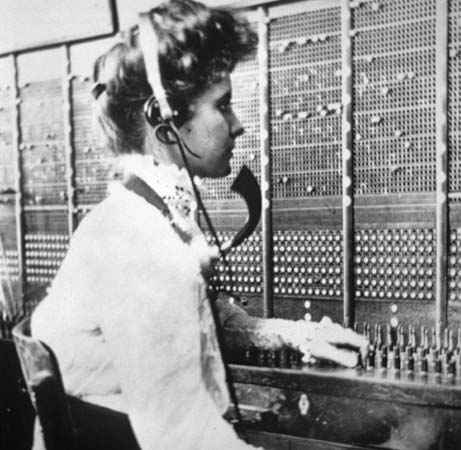
When my destiny calls, I hope I’m somewhere where I can get a damn’ signal.
Today, March 10, is the anniversary of an achievement about which I have always had very mixed feelings: One hundred thirty-six years ago today, Alexander Graham Bell called his assistant, Thomas Watson, into his office by transmitting his voice through a pair of wires, and the telephone was born.
Bell, of course, had patented his idea three days previously, and his name became synonymous with the science of electronic communication for a century. Mr Watson, meanwhile, is remembered rarely, if at all: all too often the fate of assistants. I have a weakness for the underdogs of history, however, so here’s a little something about Mr Watson:
Thomas Augustus Watson was born in Salem, Massachusetts, in 1854, which means he would have been about twenty-two in 1876, when Bell issued his famous summons. Had Watson attended college, he would have been a recent graduate when he went to work for Bell; but in fact he had dropped out of school at age 14 and then worked as a bookkeeper and carpenter for several years. He ended up at a machine company in Boston, where a number of Bell inventions were being tested: Bell hired him away from that job, and put him to work on his most famous project.
Unlike Edison’s electric light and alternating current, which a lot of people had a hard time accepting initially, the public embraced the telephone as enthusiastically at the end of the 19th century as they still do at the beginning of the 21st. Bell spoke those first words in 1876; by 1915 there were thirteen million telephones in use1 world-wide. As of 2010 there were five billion mobile phone connections.2
When it became apparent that the telephone was going to be viable as a commercial product, Watson and Bell initially split much of the credit. Although Bell was the idea man, Watson had been the engineer, actually constructing the equipment for their experiments. The two men shared their success for several years, with Bell devoting much of his time to marketing and capitalizing their creation, and Watson developing the related systems, such as the switchboard, that would make widespread adoption of the telephone possible. By the time Watson and Bell went their separate ways Watson was making enough money from his share of royalties that he no longer needed to work for a living.
Apparently not content to rest on his laurels, Watson then started a marine engine company that eventually built the US Navy’s first torpedo ships. He got his Master’s degree in 1919, at the age of 65, and a PhD two years later. He studied geology, toured as a Shakespearean actor, converted to a form of Sufi Islam, and became president of Boston’s Robert Browning fan club.
Thomas Watson died in 1934, at 80 years of age, leaving behind a wife and two daughters, (one of whom became a physician.)
Is there a point to this little excursion through history? Not really, unless it’s just to demonstrate that sometimes hard work and a willingness to open one’s mind to new things can pay off. We don’t remember Mr Watson as well as we should, given his contribution to our modern society, but then, that doesn’t seem to have been something he worried much about. He worked hard, he made some money, he worked some more. He kept learning and doing for his entire life: not because he had to, but evidently just because he enjoyed it. I’ve never been much of a fan of the telephone, as anyone who knows me can attest, so Alexander Graham Bell has never been one of my heroes, but I think we all have something to learn from a middle-school dropout who can play King Lear, quote Browning at length, knows his limestone from his limonite, and has the energy to go after his PhD (in Engineering) when he’s 67 years old.
* * *
